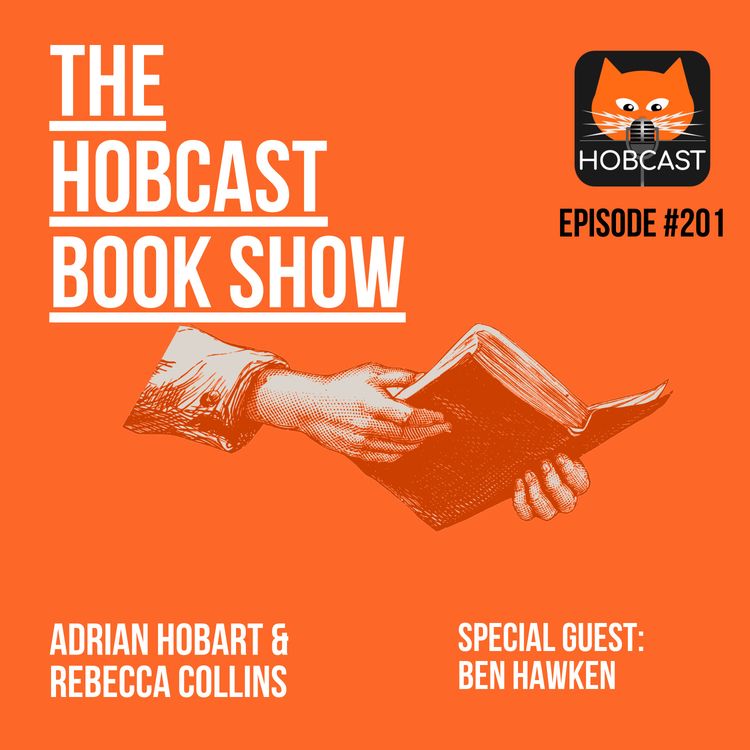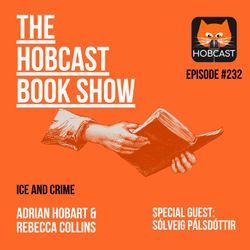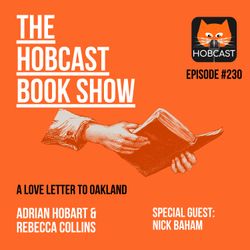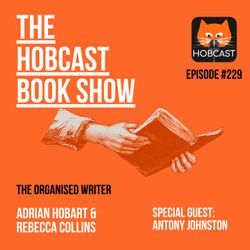Share

The Hobcast Book Show
201: Juggling a complex narrative - with Ben Hawken
The great American novelist, Sinclair Lewis, was once asked by another writer how to approach flashbacks in fiction. The answer was simple and blunt. "Don't." So what do you do if your story demands time jumps? How do you deal with the complex narrative threads and keep your readers on board? It's one of the issues that our guest, Ben Hawken, faced with his debut novel Chandelier. His solution came in his editing process. He revised his manuscript repeatedly and read it out loud to spot any inconsistencies or issues. Ben says he hopes the result is a thrilling and expansive story, "both breathtaking in its scope and intensely intimate in its approach." This is a fascinating interview delving deep into how Ben realised his ambitious vision for the novel.
Also this week, we ask if Elon Musk's reach and power is really scaring publishers off from releasing biographies of him, and we delve into the new phenomenon of low-cost re-releases of classic works that have gone out of copyright. Is it really ok to add AI generated analysis of Dickens in the preface and call it scholarship?
https://www.benhawken.com/
https://www.amazon.co.uk/Chandelier-Ben-Hawken-ebook/dp/B0DFP6R3B8
More episodes
View all episodes

236: Secrets and suspense - with Jo Furniss
01:21:31|Fear. There's a lot of it about currently. That's the currency of thriller and suspense authors of course, and our guest this week, British journalist and author Jo Furniss is brilliant at mining reader's inherent fears. Her most recent novel, Guilt Trip, poses a scenario all parents will dread: a minibus carrying the school swimming team never arrives back from a gala. The police don't know where it's gone and the school's 'no phones' policy means none of the kids has a device. They have vanished. Jo takes us through her craft, from original idea to finished novel, and shares the secrets of a great psychological suspense thriller.Also this week, a Cambridge University survey suggests that over half of authors believe AI will replace them in future, and we discuss a new scheme to ensure the book you buy is written by a human, rather than a bot.Jo Furnisshttps://www.amazon.co.uk/Guilt-Trip-unputdownable-thriller-Belinda-ebook/dp/B0DTRQHG6D
235: The real deal - with Ilana Berry
01:33:51|The Hobcast Book Show brings you an unmissable one-hour interview with U.S. author and former CIA officer I.S. Berry. Ilana's multi award-winning debut novel The Peacock and the Sparrow has been hailed as a modern spy classic, blending real-world intrigue with gripping fiction. Ilana's inspiration came from her intelligence work during the Arab Spring, and we explore her journey from intelligence to literature, uncovering the secrets behind her storytelling. If you love thrillers, espionage, and insider perspectives, this episode is your passport to the shadow world.Also this week, Adrian and Rebecca share insights from the Indie Press Network's marketing day in London, and reveal Amazon's plans to offer authors AI translations for their books.I.S. Berryhttps://www.amazon.co.uk/Peacock-Sparrow-Winner-Edgar-Award-ebook/dp/B0CTB1BC38
234: A love of modern romance - with Jeevani Charika
01:26:52|We're back! Our summer hiatus was a little longer than we planned, but we're delighted to bring you The Hobcast Book Show again. Our guest this week is Rhoda Baxter, queen of witty, heartfelt romcoms. She also writes as Jeevani Charika, exploring multicultural women’s fiction with depth and warmth. We talk about smart heroines, nice‑guy heroes, and the craft of writing under two names. A former microbiologist turned intellectual property specialist, Rhoda brings a unique perspective to her writing life—balancing science, creativity, and a love of cake. It's a truly inspiring interview.Also this week, we hear how leading UK independent publishers have warned that they're facing an existential threat, and can you really publish a book that smells of mayonnaise? Jeevani Charika and Rhoda Baxter – Comfort reads with a dash of fun
233: The Romance of Italy - with Katherine Mezzacappa
01:25:50|This week we're joined from Italy by the brilliant Katherine Mezzacappa. Born in Ireland, Katherine is now based Tuscany, a country which has inspired her work as a historical and contemporary novelist. Her most recent novel, The Ballad of Mary Kearney was published earlier this year, sees Katherine return to her Irish roots, telling the tragic tale of an 18th century nobleman who secretly marries his servant, in defiance of law, class, and religion. But Italy also features heavily in Katherine's work, including The Maiden of Florence published in 2024, based on true events involving the powerful Medici family. Writing as Katie Hutton, Katherine has also published four novels with leading publisher Bonnier Zaffre. Katherine is also a passionate advocate of short fiction, and works with us as a judge on The Henshaw Short Story competition. This interview is laced with brilliant advice for authors of all persuasions.Also this week, we hear about trouble for retail giant WH Smith, while rivals Waterstones go from strength to strength thanks to a growth in sales to a younger generation of readers.Katherine Mezzacappa – Katherine Mezzacappa – Authorhttps://www.amazon.co.uk/Ballad-Mary-Kearney-Katherine-Mezzacappa-ebook/dp/B0CZQJFJD6https://www.amazon.co.uk/Maiden-Florence-captivating-historical-retelling-ebook/dp/B0CWFBKHX7
232: Ice and Crime - with Sólveig Pálsdóttir
01:27:36|If you're beginning to think we're obsessed with Icelandic crime fiction here on The Hobcast Bookshow - you may be right. We're delighted to be joined this week by our third great Icelandic crime fiction writer in recent months, Sólveig Pálsdóttir, the author of the popular Ice and Crime series. As we explore in this wide-ranging interview, Sólveig enjoyed a varied career prior to becoming an author, including several years as one of Iceland's leading actors, before family life encouraged a switch to teaching, with the occasional appearance in TV dramas. But now her principal focus is writing further cases for her detectives, Guðgeir and Elsa Guðrún, translated into English by the brilliant Quentin Bates and published by Corylus Books.Also this week, we discuss the threat posed by AI-written low quality books posing as established titles. Is it time for online retailers to tighten up their submission protocols?Sólveig Pálsdóttir – Corylus Bookshttps://www.amazon.co.uk/dp/B08Y5NPMKV
231: Launching a new series - with Victoria Dowd
01:36:12|In many ways, British crime authors are lucky. They stand on the shoulders of giants from the so-called 'Golden Age' of the genre: Agatha Christie, Dorothy L. Sayers, Margery Allingham, G.K. Chesterton and Ronald Knox were just a few of the greats who established both the rules of the genre, and laid the foundations for crime fiction's enduring popularity with UK and international readers. Our guest this week, Victoria Dowd, is an avowed fan of this era, so when it came to creating her new series, The Charlotte Blood Chronicles, it was natural that she set the opening novel, Death in the Aviary in 1928. Victoria has given both the traditional country house setting and locked mystery a twist: her cast of characters are trapped in a lift, the lights cut out, there's a shot, and a victim lies dead. As Victoria tells us, launching a new series in a historical period required huge levels of research, not least into the habits and behaviour of ravens! It's a departure from the books that established Victoria as one of Britain's rising crime-writing stars, The Smart Woman's Mystery Series. And it doesn't harm that Victoria is a former barrister who worked regularly at the Old Bailey.Also this week, we ask is the CEO of Penguin Random House's response to the recent scandal engulfing Raynor Winn's The Salt Path adequate? And can you really give each of the novels long-listed for this year's Booker Prize a two word review? About – Victoria Dowdhttps://www.amazon.co.uk/Death-Aviary-Charlotte-Blood-Chronicles/dp/1915523532https://www.amazon.co.uk/COMPLETE-MYSTERIES-gripping-terribly-mysteries-ebook/dp/B0DQVHFGKB
230: A love letter to Oakland - with Nick Baham
01:34:32|It sometimes feels as if this podcast feeds our "must visit pile". Whether it's Iceland, Seattle, Barcelona, Romania or Maine, our guests fuel our wanderlust with their passion for their home areas. That's the case again this week with our enthralling conversation with Dr. Nicholas Louis Baham III as we discuss his debut crime novel, The People's Detective. Set in present day Oakland, California, it's a celebration of all facets of Nick's fascinating home city. As he tells us, Oakland is a city of contradictions with great wealth and considerable poverty, and being a major port, a true melting pot of different nationalities. It's also a city with a proud record of protest and the struggle for equality, which underpin Nick's work. Nick's passion for Oakland shines through in this fascinating interview.Also this week, as the dust settles on another Harrogate Crime Fiction festival for another year, we ask "how much?". Yes, it seems bar prices have reached a new stratospheric level at the UK's premier crime fiction event. And we celebrate the growth of niche independent bookshops as a romance specialist store opens in Notting Hill in London.Home | Nicholas Louis Bahamhttps://www.amazon.co.uk/Peoples-Detective-Sonny-Trueheart-Mystery-ebook/dp/B0D886W1ZG
229: The Organised Writer - with Antony Johnston
01:31:04|Some guests are so good we have to give them two shows. So we're delighted to welcome back Antony Johnston again this week to discuss the methods and techniques he uses to cope with writing multiple projects in multiple formats at the same time. His advice is based on years or trial and error during his career as a writer for video games, films, graphic novels and fiction, as well as extensive research into many productivity systems and ideologies. First published in 2020, his book The Organised Writer distils all this research and advice, and suggests methods all creative professionals can adopt to improve their productivity and flow. So prepare to put aside a weekend, re-organise your workspace, and enjoy the benefits of uninterrupted creative endeavour. It's a brilliant interview full of useful insights and advice.Also this week, we delve into the controversy surrounding Raynor Winn, the author of the best-selling memoir The Salt Path, and we discuss if AI really can translate your work into multiple languages at the press of a button.Antony Johnstonhttps://www.amazon.co.uk/Organised-Writer-projects-never-deadline/dp/1472977181
228: The Polymath Writer - with Antony Johnston
01:16:30|Antony Johnston's list of achievements as a writer take the breath away. His work has been made into a star-studded Hollywood film. He's a legend in the video games industry with some of the biggest franchises amongst his credits. He's worked in the Marvel Comic universe with superheroes such as Daredevil and Wolverine. Antony is also an accomplished novelist working across a number of genres, including thrillers, cosy crime, and now, an innovative take on the "whodunnit" where readers try to solve the crime themselves and have to make decisions as they read Can You Solve The Murder which was published last month. This is a fascinating interview. So good in fact, that we've split it into two parts. Next week Antony will take us through his system for improving your productivity as a writer or freelance creative.Also this week, we run through the winners of this year's CWA Daggers, and ask, should job-sharing become standard practice in publishing?Antony JohnstonCan You Solve The Murder: https://www.amazon.co.uk/Can-You-Solve-Murder-Investigate-ebook/dp/B0D5QP9W2HDog Sitter Detective series: https://www.amazon.co.uk/dp/B0BW9MGPQC